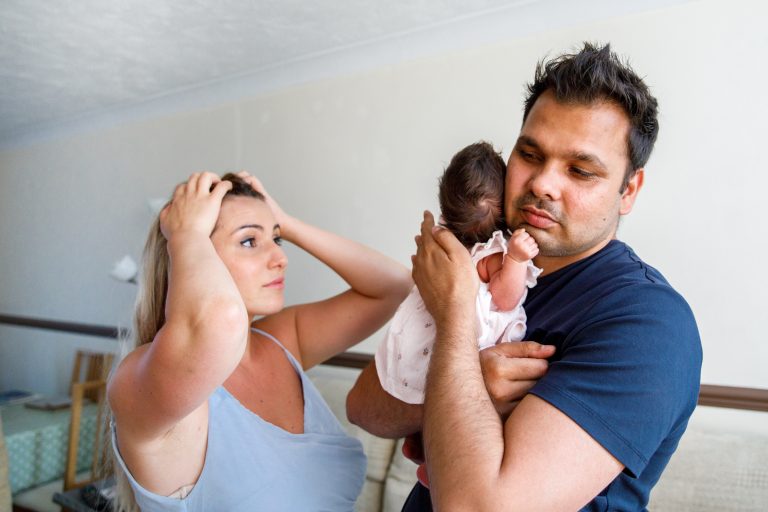Having a baby changes your relationship – suddenly there is another person in this dynamic and that is going to have an impact on all of you. Whatever type of relationship you are in, it will still need to be worked on now and in the future.
If you are bringing up a baby on your own, it can be helpful to have a supportive network around you if possible. If you are coping on your own away from friends and family do let your GP, midwife or health visitor know so they can link you into local support and other mums who may be in a similar position. There are also supportive online groups and forums such as Gingerbread, Single Parents Advice and Support Services (SPSAS) and the NHS lone parent advice. Moderated peer support forums such as ChannelMum and other parenting websites.
If you are living with your parents, or other relatives this can cause extra stresses, it is hard not to have much space of your own. Others may be well meaning but can be intrusive or feel they know what is best for your baby. Stay calm and firm and don’t let others undermine you – they may have had children, but YOU know what is best for YOUR baby. Trust your instincts you know more than you think you do, set clear firm boundaries, and let others know how they can best help you.
Couples often think about how a baby is going to affect their relationship. What they often pay less attention to is how their relationship affects the baby. How you are with each other has a big impact on your baby. Babies are very sensitive to what goes on around them, they are like little sponges absorbing it all. So, if you have a happy, relaxed relationship your baby will pick up on this. If your relationship is tense or unhappy your baby will also be affected by this.
No relationship is perfect, and the evidence shows that having a baby does put an additional strain on all couple relationships. It is normal for there to be an increase in conflict over the first year – this is a huge change for both of you and it takes time to adjust.
Research shows there is a 92% increase in couple conflict in the first year of having a baby and that 40-67% of couples report a decline in relationship satisfaction during the first three years after having a baby.
So if you are experiencing more disagreements and feel less satisfied with your relationship, this is fairly common. Do talk to your health visitor if you are feeling unhappy, your health visitor is there to support you and your family.
If you are aware of some of the pitfalls you can take steps to baby proof your relationships. These tips, although aimed at couples, can also work well for many of your other relationships that may be feeling more tense post birth.
Tips for couples
It is worth taking time to invest in your relationship – like anything else it needs to be worked on if it is to survive and thrive. We look after and service our car if we want it to work well – so we need to look after our relationships.
How can you take steps to baby-proof your relationship and find time for each other in parenthood?
Here are some tips that relationship experts have developed, based on what works:
1. Communication – listening and talking with each other
Evidence shows that spending some time each day listening to each other with your full attention is the best way to improve your relationship.
Active listening means really trying to focus on what they say and notice the feelings behind the words. Try and put yourself in the other person’s shoes and see the world from their point of view without interrupting them. Reflect back on what you have heard and notice their body language or the feelings behind the words.
This active listening takes practice, but it is one of the most powerful things you can do to improve your relationship with each other.
Even if you can only spend 2 to 3 minutes a day doing this for each other it will make a difference. Most people don’t feel listened to or heard and are crying out for this.
We have two ears and one mouth, so it is suggested we spend twice as long listening as talking. This simple tool of listening can work well with all our relationships.
2. The magic ratio of “five to one”
This 5 to 1 ratio was discovered by John Gottman, a relationship expert in the USA.
It means that to have a successful relationship with your partner, you need to have five positive interactions with them for each negative one.
Spend time finding things you can praise or comment on positively. Saying thank you, a gentle touch or a hug; all these count as positive interactions.
Look for the good in the other person and notice that and comment on it. We tend to be a ‘critical society’ likely to complain and find fault, failing to notice and focus on what is going well and the good things we have in life.
Learn to appreciate each other and the things that attracted you to them in the first place.
The good news is this magic ratio can help with all your relationships.
3. Showing love and affection for each other
Words and small acts of kindness mean a lot and are a really easy way of improving your relationship. They can help make each other feel valued, loved and respected.
A cup of tea, a hug, saying thank you or noticing small things you do for each other go a long way. Notice the small everyday things that are all too easy to take for granted.
What is your love language? How do you like to receive love and affection?
You can discover your love language by taking the free quiz below and invite your partner to do the same. Then share your results with each other.
The Love Language Quiz
4. Who does what? The division of household chores

Who does what in the house when it comes to household chores and responsibilities? This is one of the things couples argue about most.
It often falls to the main caregiver; usually mum, to bear the brunt of childcare, housework and household responsibilities.
Have a look at the table below to see who does what in your house.
Score yourselves below on the baby care list who does what?
Mum does it all=1
Equal=5
Dad does it all=9
1. Feeding the baby/child
2. Keeping track of feeding
3. Changing the baby’s nappies
4. Bathing the baby
5. Responding to the baby’s cries
6. Responding in the night
7. Taking the baby out
8. Choosing toys for the baby
Now score yourself on the household chores list
Mum does it all=1
Equal=5
Dad does it all=9
1. Emptying the dishwasher
2. Washing and ironing
3. Cooking the dinner
4. Tidying up and hoovering
5. Cleaning the house
6. Shopping
Add up and compare your scores.
How did you do? Are things shared equally or is there an uneven distribution of work? How will you address this to make things fairer?
Sex, romance and intimacy
Sex and intimacy are the second most common things couples argue about after the division of household labour.
Honesty and communication are key so you can talk openly about this to each other in a helpful, kind and supportive way.
Watch the video here with a couple talking about sex and relationships.
Where to get further help
Your midwife, health visitor, GP or family planning clinic can all provide help and support.
It is common to lose interest in sex after childbirth. Many family planning clinics have a sex therapist who works with them or can refer you to one if things do not improve.
Sometimes it may be a physical difficulty after having given birth, particularly if was traumatic.
Fear of pain or future pregnancies, tiredness, postnatal depression and anxiety plus other factors can all affect your sex life and libido.
Don’t suffer in silence – talk about it and ask for help. It is common and health professionals are used to dealing with sensitive topics like this.
Resources
There is lots of information online for mums, dads and partners about relationships. Below are a few useful websites.
You can visit the Channel Mum website for information on how you can baby-proof your relationship.
The OnePlusOne website has resources to help with couple relationship skills, particularly when you have had a baby.
The Click Relationships Matter website offers an online community to share questions and stories with, try fun and helpful activities, or get private support from a Click listener. You can register online for a free account.
Relate offer help and relationships support for everyone. They have launched new service, relatehub, offering free 30 minute WebChats with their Relationships and Wellbeing Advisors as a direct response to the COVID-19 pandemic.
